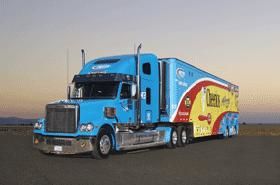Can I Remove The Manual Transmission Restriction On My CDL
Topic 29212 | Page 2
This is merely the process of removing a restriction from your current CDL. I can't see a learner's permit being required for that.
The only time a learners permit would be required is if you are going from a class B to a class A.
CDL:
Commercial Driver's License (CDL)
A CDL is required to drive any of the following vehicles:
- Any combination of vehicles with a gross combined weight rating (GCWR) of 26,001 or more pounds, providing the gross vehicle weight rating (GVWR) of the vehicle being towed is in excess of 10,000 pounds.
- Any single vehicle with a GVWR of 26,001 or more pounds, or any such vehicle towing another not in excess of 10,000 pounds.
- Any vehicle, regardless of size, designed to transport 16 or more persons, including the driver.
- Any vehicle required by federal regulations to be placarded while transporting hazardous materials.

Seeing if the cops will let "breaking your DL restrictions slide" Doesnt sound like best practice for commercial drivers. I just cancelled a school for multiple reasons. But the kicker was I'd be slapping a restriction on that license. Thats like getting a night time blindness restriction slapped on your license and seeing how that rides. My guess is you get dropped off at a truck stop permanently to guard trucks for some company that is too cheap to afford a yard for that waiting for your "loads"..Im not trying to handicap myself right off the bat as a new driver. No thanks. To turn around and have to break the law to have that restriction removed. No matter how much your pressure salesman wants to convince you youre a real boy paying for a real CDL and all the cool companies are automatic now...Sounds like a load..
CDL:
Commercial Driver's License (CDL)
A CDL is required to drive any of the following vehicles:
- Any combination of vehicles with a gross combined weight rating (GCWR) of 26,001 or more pounds, providing the gross vehicle weight rating (GVWR) of the vehicle being towed is in excess of 10,000 pounds.
- Any single vehicle with a GVWR of 26,001 or more pounds, or any such vehicle towing another not in excess of 10,000 pounds.
- Any vehicle, regardless of size, designed to transport 16 or more persons, including the driver.
- Any vehicle required by federal regulations to be placarded while transporting hazardous materials.
Hmm. A significant portion of carriers are entirely auto fleets right now. Getting your license, assuming you actually make it all the way through school, wether it be company provided or private, is simply the first step in the process. Having an auto only restriction will not in any way hamper you. What will hamper you however is having a closed mind, not communicating and not being a safe, efficient driver.
There are carreirs that do have manuals, but the first priority should be getting your license and that can be a tall order in its own right. Many people come into this industry with the misguided notion that they will simply be able obtain their license and start drving right away. Its a much more difficult path than they realize. The mindset should be on taking the path that is going to ensure they are successful in passing the test. Guarantee you will have your hands full just trying to pass your road test even in a manual. In other words, its not as easy to obtain as you may think it is, take the most basic route to getting it. Then get worry about the restriction if you last your first year in the industry. Instead, concentrate on building your foundation for a solid career.
*even more so in a manual
New Reply:
New! Check out our help videos for a better understanding of our forum features

















Preview:









 TT On Facebook
TT On Facebook
At my previous company a driver they hired needed the restriction removed. Although he was a licensed driver (with restriction for auto) he spent a couple weeks driving with another driver that didn't have the restriction in the passenger seat. He then went and did atleast the driving portion at the Iowa DMV but I can't recall if he did pretrip and skills as well. It was an issue they dealt with frequently in both IA and Illinois so I'd like to think they had verified it was legal but who knows. I'd recommend calling your state or DOT office and double checking that's the legal way to do it. I'd hate for you to get a serious ticket for doing it how we say we've seen it done for your state to do it differently.
DOT:
Department Of Transportation
A department of the federal executive branch responsible for the national highways and for railroad and airline safety. It also manages Amtrak, the national railroad system, and the Coast Guard.
State and Federal DOT Officers are responsible for commercial vehicle enforcement. "The truck police" you could call them.
Dm:
Dispatcher, Fleet Manager, Driver Manager
The primary person a driver communicates with at his/her company. A dispatcher can play many roles, depending on the company's structure. Dispatchers may assign freight, file requests for home time, relay messages between the driver and management, inform customer service of any delays, change appointment times, and report information to the load planners.DMV:
Department of Motor Vehicles, Bureau of Motor Vehicles
The state agency that handles everything related to your driver's licences, including testing, issuance, transfers, and revocation.